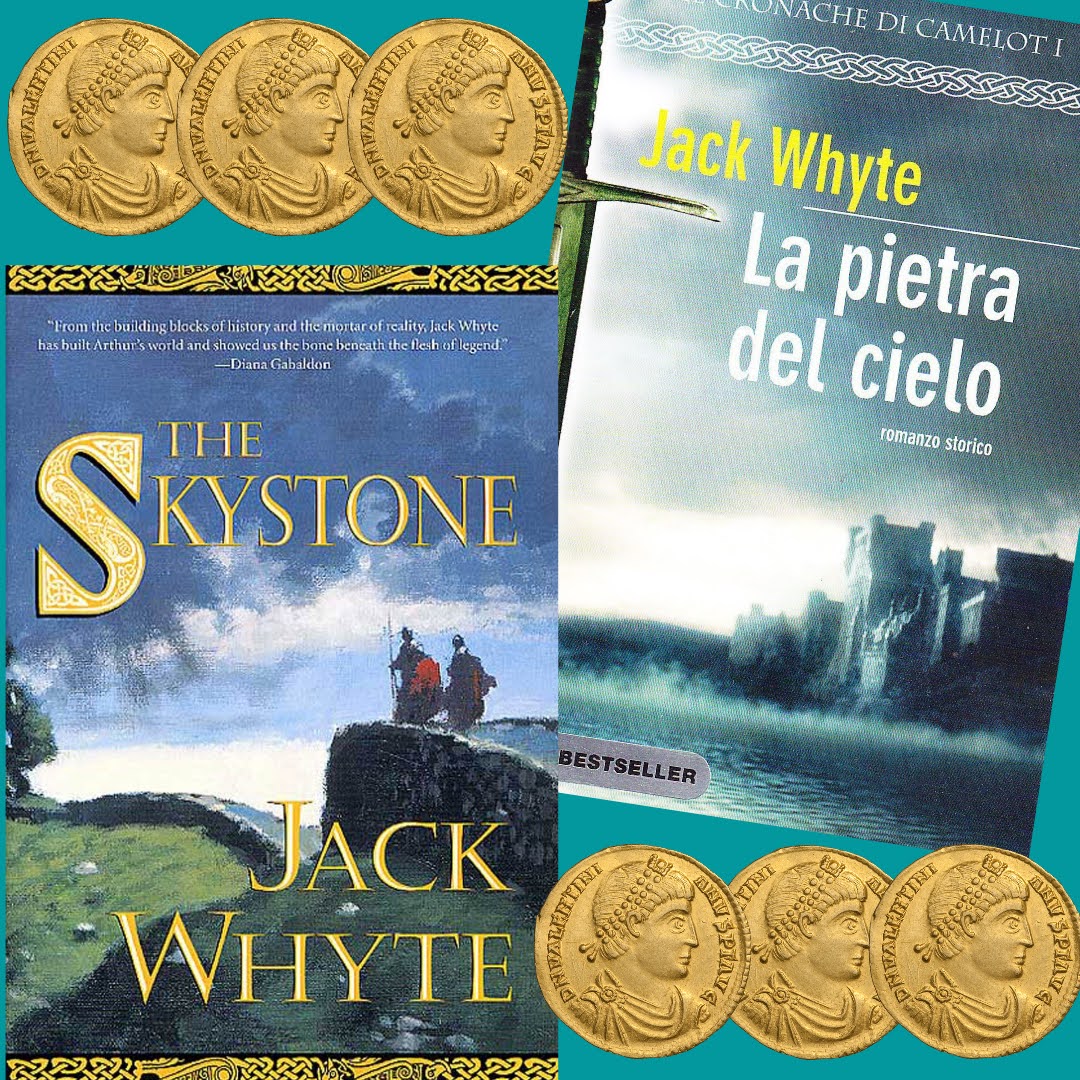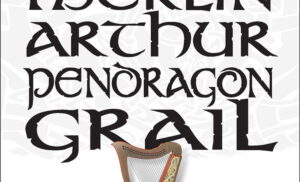
The Skystone (The Camulod Chronicles vol. 1) * La pietra del cielo (Le cronache di Camelot vol. 1)
The Skystone is the first novel in The Camulod Chronicles by Jack Whyte and it’s about the Arthurian legend and its Roman origins. Published in 1996 and set in the 4th Century A. D. Roman Britain, this book tells the story of Publius Varrus, a valuable Roman centurion who after many years of fighting for the Roman army in Britannia inherits his grandfather’s forgery, finding also a special dagger made with a stone “fallen from the sky” long time ago. The metal from this stone is unique and different from any other known to man, and Varrus’s determined to find other stones, but his plans change after he gets into a fight with a very rich and powerful Roman and badly disfigures him. He’s so forced to run away and moves to a remote Britain area owned by his former commander, now friend, Caius Britannicus, a noble Roman also born and brewed in Britain. There he gets to properly know Druids and Celts, he starts a family and finds other fragments of the skystone, which clearly will be used to forge Excalibur. In the background, the Roman Empire falls, starting a domino effect that will impact on all the people living in the Roman colonies.
If you love the Arturian legend you can’t miss this series. The writing style’s quite mainstream, but it’s good and details, historical facts, and the descriptions of battles and characters are superb. The book’s never boring and it feels like being there, in the story, and the protagonists are easy to love. There are also many similarities between the fall of the Roman empire and that of our society. It’s not uncommon to find more meaningful messages in novels than in essays or history books, if one doesn’t stop at the surface and reads on multiple levels.
Here are some quotes from the book:
They are ordinary but courageous people who decided they could not continue to live under the Empire's rules, even then."
I frowned. "For example?"
"Examples? Try crippling taxes, unjust and self-serving laws, constant inflation, corrupt officials, restrictive regulations governing the way they lived their lives and constant government interference."
I had nothing to say to this, so he continued. "They walked away — out of the Empire. Away from their homes, from their businesses, from their employment. Away from the taxes and the duties and the burdens. They walked away to the hills and the forests and they refused to go back. They built huts and they lived on whatever they could grow and hunt for themselves." His voice was almost a monotone. "It started as a trickle at the end of the third century and it grew into a flood. We're now at the end of the fourth century and it's still going on. For over a hundred years now these Bagaudae have paid no taxes, obeyed no Roman laws and spared the lives of no Roman soldiers who came after them. Most of them live communally on huge villa farms and settlements. Each man contributes to the life of the commune with his own skills and abilities. They have no use for money; they barter. And among their numbers are physicians, magistrates, architects, lawyers, administrators and a large number of professional soldiers."
"That's incredible, " I said. "And the Empire does nothing?" He spread his hands wide in a gesture that was purely Gallic. "What can the Empire do? The bureaucrats are afraid that the story will spread. The official policy is to do nothing that will attract attention to the problem. To ignore it, in the hope that it will go away. Rome leaves the Bagaudae in peace, because the alternative might stir up a furore that could breed an Empire full of Bagaudae."
==========
The rot is everywhere. Mutiny is widespread — no discipline, no order, no structure left with any meaning. More barbarian mercenaries in the army today than there have ever been before, although every one of them now calls himself a Roman citizen. You know how I feel about that. But it's the structure that's lacking, Varrus. The foundation. There are no standards left. No symbols of worthiness for the young people of the Roman world to align themselves with. No values that can be accepted on faith and relied upon. The whole world's falling into chaos.
==========
"In other words, my friends, the Empire is out of the trading business, and you know what that means. "
Plautus, who had sat still during all of this, was blinking in perplexity, a worried frown bisecting his forehead. "I don't know, " he said. "What does that mean?"
Firma looked him straight in the eye. "It means dissolution, my friend — gradual, at first, but definite, progressive disintegration. Break-up. The end. "
Poor Plautus was baffled. "The end of what, in the name of God?" Firma snorted with disgust. "Of everything! The end of the chain of supply that keeps the Roman Mob fed and clothed. The end of the web of commerce that keeps the Empire from collapsing. The end of the status quo. The end of Rome's dominion. Shall I go on? Caius, here, has been prophesying it for years, and we have all been laughing at him and calling him an alarmist. "
"But what about the government?" This voice belonged to Quintus Varo. "Can't they do anything to help you?"
Terra's raised, sardonic eyebrow was eloquent. "Ah, yes, of course. The government. They have a lot to say about helping us. For one thing, they are graciously allowing us to remain operative — fully operational and fully liable — in spite of the fact that we choose to opt out. The government has ordered us to continue trading, to continue losing all our investments, and threatens us with seizure and confiscation of all our property if we refuse to obey." Shocked silence greeted this remark.
"About a week before we left to come here," he continued, "we received advance notice from a trusted friend that a military detachment was on its way to visit us, 'to help us protect our interests. ' We tidied up our affairs as well as we could in a week, collected our collectable assets — again, as many as we could assemble — cleaned out our vaults, signed a voluntary legal transfer of our fleet to the imperial government and left town before the military arrived. " He eyed us all again. "Everything we could not realize and carry with us has been forfeited as penalty for our crime of non-performance. We are outlaws now — proscribed fugitives."
==========
"This whole conversation is treasonous, Caius. According to those maggots in Rome and in Londinium, Terra and Firma commit treason by refusing to bankrupt themselves throwing good money after bad. By refusing to destroy themselves to provide an illusion of normality for faceless thieves who live in terror of the Mob, the Mob that wants everything for nothing. Why do you people think the Emperor and his Court live in Constantinople? They decided long ago that they wanted nothing to do with Rome and her sweaty, evil-tempered, vile-smelling citizenry. Think about that!" He glowered at the faces that watched him, as if defying any of us to disagree with him. "According to the maggots, none of us around this fire has any right to life. We exist for their benefit. And at their pleasure. Faugh! It makes me want to spew to think that SPQR, the symbol of the Senate and the People of Rome, was once the greatest symbol of freedom and the rights of free men in history! The people in Rome are a herd of murderous, carnivorous cattle, and the Senate is a eunuch! If it be treason to refuse to sacrifice everything we hold noble to the gluttonous maw of the Roman Mob, then I am a traitor!"
==========
"The entire world is going to go down into chaos when Rome falls, and the biggest danger facing anyone today is the temptation to believe that it cannot, or that it will not happen. Believe me, my friends, the only people who will survive that fall will be those people who have prepared for it by preparing themselves. By preparing their own defences. By preparing their own food supplies. By planning for their own continued, structured existence in advance of the time of chaos."
================================================================================
La pietra del cielo (Piemme) è il primo romanzo del ciclo “Le cronache di Avalon”, di Jack Whyte, che racconta il mito arturiano a partire dalle sue origini romane. Pubblicato nel 1996 e ambientato nella Britannia romana del IV secolo d.C., questo volume racconta la storia di Gaio Publio Varro, centurione romano di valore che, dopo molti anni nell’esercito romano in Britannia, riprende in mano la fonderia del nonno, il quale gli ha lasciato un pugnale speciale fatto con una pietra “caduta dal cielo” molto tempo prima. Il metallo da essa estratto è speciale e diverso da qualunque altro visto prima. Varro è determinato a trovare altre pietre dal cielo ma nel frattempo conduce i suoi affari, che vanno bene, finché in un viaggio non si scontra con un romano molto facoltoso e di famiglia molto potente, sfregiandolo malamente. È quindi costretto a fuggire e si rifugia in una zona della Britannia posseduta dal suo ex comandante e ora amico Gaio Britannico, un aristocratico romano anch’egli nato e cresciuto in Britannia. In quel luogo avrà la possibilità di conoscere bene i druidi e i celti, di farsi una famiglia e di ritrovare la pietra del cielo, che chiaramente si capisce verrà poi usata per forgiare Excalibur. Sullo sfondo, lo spettro della caduta dell’impero romano che naturalmente avrà un effetto domino su tutte le popolazioni delle sue colonie.
Chi ama la leggenda arturiana non può non leggere questo ciclo di romanzi. Lo stile è abbastanza commerciale, ma i dettagli, i riferimenti storici, le descrizioni delle battaglie e i personaggi sono eccellenti. Non ci sono parti morte o noiose, sembra di essere lì, nel bel mezzo della storia, e ci si affeziona subito ai protagonisti. Incredibili inoltre le similitudini tra la caduta dell’impero romano e il crollo della nostra società odierna: non è raro trovare nella narrativa messaggi molto più significativi di quelli che si possono leggere nei saggi o nei libri di storia, se si legge a più livelli e non ci si ferma solo alla superficie.
Alcune citazioni:
«Sono persone semplici e coraggiose che hanno deciso che non potevano più continuare a vivere sotto le regole dell'Impero.» […] Immagina tasse paralizzanti, leggi ingiuste e utili solo a se stesse, inflazione costante, regole restrittive che governano le loro vite e costante interferenza del governo.» […] «Se ne andarono, fuori dall'Impero. Via dalle loro case, dai loro affari, dal loro impiego. Via dalle tasse e dai doveri e dagli impegni. Se ne andarono sulle colline e nelle foreste e si rifiutarono di tornare indietro. Costruirono delle capanne e vissero di quello che potevano coltivare e cacciare da soli.» […] «È cominciato come un rigagnolo alla fine del III secolo ed è diventato un torrente. Adesso siamo alla fine del IV secolo e il torrente scorre ancora. Da oltre cento anni ormai questi Bagaudi non pagano tasse, non ubbidiscono a leggi romane e non risparmiano la vita dei soldati romani che li braccano. La maggior parte di loro vive in comunità in grandi fattorie e insediamenti. Ogni uomo contribuisce alla vita della comunità con le sue capacità e abilità. Non usano denaro, ma il baratto. E tra di loro ci sono medici, magistrati, architetti, avvocati, amministratori e un gran numero di soldati di professione.» «È incredibile» dissi. «E l'Impero non fa niente?» Allargò le mani in un gesto molto celtico. «Cosa può fare l'Impero? Gli amministratori temono che la storia si diffonda. La politica ufficiale è non fare niente che attragga l'attenzione sul problema. Lo si ignora, nella speranza che finisca da solo. Roma lascia i Bagaudi in pace, perché fare diversamente provocherebbe un furore che potrebbe riempire l'Impero di Bagaudi.»
==========
«C'è una malattia che colpisce tutto l'Impero. Il marciume è ovunque. La ribellione è ovunque: nessuna disciplina, nessun ordine, nessuna struttura di qualche rilevanza. Ci sono più mercenari barbari nell'esercito di quanti ce ne siano mai stati prima, anche se ognuno di loro si definisce oggi cittadino romano. Tu sai come la penso in proposito, ma sono le strutture che mancano, Varro. I fondamenti. Non ci sono più modelli. Nessun simbolo di rispettabilità con cui i giovani del mondo romano possano identificarsi. Nessun valore accettabile per fede su cui basarsi. L'intero mondo sta crollando nel caos.»
==========
«In altri termini, amici, l'Impero non commercia più e voi sapete cosa questo voglia dire.» Plauto, che era rimasto in silenzio per tutto il tempo, batteva le palpebre perplesso, con una profonda ruga di preoccupazione in mezzo alla fronte. «Io non lo so. Cosa vuol dire?» Firma lo guardò dritto negli occhi. «Significa dissoluzione, amico, dapprima graduale: una netta, progressiva disintegrazione. Il collasso. La fine.» Il povero Plauto era confuso. «Ma la fine di cosa, in nome di Dio?» Firma sbuffò con disgusto. «Di tutto! La fine della catena di forniture che nutre e veste il popolo di Roma. La fine della rete commerciale che impedisce all'Impero di disfarsi. La fine dello status quo. La fine del dominio di Roma. Devo proseguire? Gaio, qui presente, lo prevede da anni e noi abbiamo riso di lui, chiamandolo un allarmista.» «Ma cosa fa il governo?» La voce era quella di Quinto Varo. «Non possono fare qualcosa per aiutarvi?» Il sopracciglio alzato di Terra denotava sarcasmo. «Oh, sì, certo. Il governo. Parlano molto di aiutarci. Per prima cosa stanno gentilmente permettendoci di rimanere operativi -completamente -completamente operativi e completamente responsabili - a dispetto del fatto che noi abbiamo scelto di chiudere. Il governo ci ha ordinato di continuare a commerciare, di continuare a perdere i nostri investimenti, e minaccia di prendere e confiscare tutte le nostre proprietà se ci rifiutiamo di obbedire.» Un silenzio perplesso accolse quella affermazione. «Una settimana prima che partissimo diretti qui,» continuò, «abbiamo saputo da un amico fidato che un distaccamento militare era in cammino per venire a farci visita, “per aiutarci a proteggere i nostri interessi”. Abbiamo liquidato i nostri affari come meglio abbiamo potuto in una settimana, raccolto tutti i beni che potevamo, svuotato le nostre cantine, firmato un trasferimento legale della nostra flotta al governo imperiale e lasciato la città prima che i militari arrivassero. Tutto quello che non abbiamo potuto vendere o portare con noi è stato confiscato come punizione per il nostro crimine di inadempienza. Ormai siamo dei fuorilegge, dei fuggiaschi.»
==========
«Tutta questa conversazione è tradimento, Gaio. Secondo quelle larve a Roma e a Londinium, Terra e Firma commettono tradimento rifiutando di finire in bancarotta, buttando moneta buona contro moneta cattiva. Rifiutando di distruggere se stessi per dare un'illusione di normalità a ladri senza volto che vivono nel terrore del popolo, un popolo che vuole tutto senza dare niente. Perché pensate, voialtri, che l'imperatore e la sua corte vivano a Costantinopoli? Hanno deciso molto tempo fa che non volevano avere niente a che fare con Roma e i suoi cittadini, sudati, malvagi, puzzolenti. Pensateci!» Guardò sdegnato i volti che lo guardavano, come se avesse voluto sfidarci tutti a contraddirlo. «Secondo quelle larve, nessuno di noi che siamo qui intorno al fuoco ha il diritto di vivere. Esistiamo solo per il loro vantaggio. E il loro piacere. Che schifo! Mi viene voglia di sputare se penso che una volta SPQR, il simbolo del Senato e del Popolo di Roma, era il più grande simbolo di libertà e dei diritti degli uomini liberi di tutta la storia! Il popolo di Roma è una mandria di animali assassini e carnivori e il Senato è un eunuco. Se è tradimento rifiutarsi di sacrificare tutto quello che riteniamo nobile alle mascelle rammollite della popolazione romana, allora sono un traditore!»
==========
«Quello che stiamo facendo ora non è solo parlare di sopravvivenza. La stiamo pianificando! Tutto questo è reale. Stiamo parlando della fine del mondo che conosciamo. Noi crediamo, ognuno di noi crede, che ci piaccia o no, che la fine verrà, e che quando questo succederà, quando cadrà l'Impero, niente di quello che conosciamo sarà più lo stesso.»
==========
«L'intero mondo cadrà nel caos quando Roma cadrà e il pericolo maggiore oggi è la tentazione di credere che questo non possa accadere, che non accadrà. Credetemi, amici, i soli che sopravviveranno al disastro saranno quelli che si saranno preparati. Allestendo le difese. Accumulando riserve di cibo. Pianificando la continuazione e la strutturazione della propria esistenza prima del caos.»




